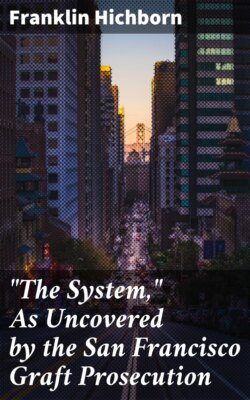Читать книгу "The System," As Uncovered by the San Francisco Graft Prosecution - Franklin Hichborn - Страница 5
На сайте Литреса книга снята с продажи.
CHAPTER II.
The Ruef Board of Supervisors.
ОглавлениеTable of Contents
No observer of San Francisco politics, not even Ruef himself, had expected the entire Union-Labor party ticket to be elected. The election of the Supervisors was the greatest surprise of all. Ruef, with his political intimates, had selected the Supervisorial candidates, but more with a view to hold the organized labor vote for Schmitz than with idea of the fitness of the candidates for the duties involved in managing the affairs of a municipality of 500,000 population.[15] Not one of the eighteen elected was a man of strong character.[16] Several were of fair, but by no means exceptional ability. Of this type were Gallagher, an attorney of some prominence who acted as go-between between Ruef and the Supervisors; Wilson, who was a sort of second man to Gallagher, and Boxton, a dentist.
But for the most part they were men who had led uneventful lives as drivers of delivery wagons, bartenders and clerks. Without an exception, they saw in their unexpected elevation to the Board of Supervisors opportunity to better their condition. Some of them would not, perhaps, have sought bribes; few of them knew just how they could employ their office to their best advantage; but from the hour of their election the idea of personal advancement was uppermost in the minds of the majority of the members of the Schmitz-Ruef Board of Supervisors.[17] Their ignorance of the requirements of their office, their failure to appreciate their large responsibilities, and above all their ill-defined ambitions made them promise of easy prey for the agents of the public-service corporations, who were playing for special privileges worth millions.
None realized this better than Ruef. From the beginning, he recognized that the likelihood of individual members of the board yielding to temptation to petty gain[18] threatened his own larger purposes. He let it be known that he would himself personally prosecute any one of them whom he discovered to be “grafting.” Ruef was emphatic in his position that the Supervisors should have no financial dealings with those seeking special-privilege advantages. He even defined regular procedure for dealing with persons and corporations that might elect to catch the easiest way to accomplish their purposes by the use of bribe money. To this end he arranged:
(1) That Supervisor James L. Gallagher[19] should represent him on the board. The Supervisors at once accepted Gallagher, and dealt with him as Ruef’s recognized agent.
(2) Finally Ruef arranged for a regular weekly caucus[20] to be held each Sunday night, on the eve of the regular meeting day of the board, Monday.
The public was not admitted to these caucuses. Those who were admitted were Ruef, Mayor Schmitz, George B. Keane,[21] clerk of the Board of Supervisors, who also acted as secretary of the caucus, and the eighteen Supervisors.
At these meetings, which were held every Sunday evening, Ruef was the dominating figure. Supervisor Wilson, testifying at the graft trials, stated that Ruef took the position of “chief counsel and adviser for the board in matters that were to come before the board.”
Keane, as secretary of the caucus, took full notes[22] of the proceedings and sent written notices[23] of the meetings to each of those who were admitted.
The first of these caucuses was held shortly before the Schmitz-Ruef board took office. The organization of the board was provided by the Supervisors authorizing Ruef and Schmitz to make up the committees. Ruef undertook the task. He prepared the committee lists, and submitted his selections to Schmitz and Gallagher. Schmitz and Gallagher suggested unimportant changes. The committees were then announced to the Supervisors at the next caucus. There were objections raised, but these objections, with one exception, were denied in all important particulars. The organization of the Schmitz-Ruef Board of Supervisors was thus perfected.
Ruef’s way seemed clear. The committee organization of the Board of Supervisors was his own. The Supervisors were to hold no open meeting until they had met with him in secret caucus to ascertain his wishes. The official clerk of the board, who was also secretary of the caucus, was his tried henchman. Gallagher, the ablest of the Supervisors, flattered at being made his representative, and further bound by mercenary ties, was ready to do his slightest bidding. And never had entrenched boss more fruitful field for exploitation.
But scarcely had the new administration been installed, than a weak point developed in Ruef’s position. District Attorney William H. Langdon, who had been elected on the Ruef ticket, gave evidence that he proposed to enforce the law, regardless of the effect upon the administration of which he was a part, or upon Ruef’s plans and interests.
The first intimation the public had of Langdon’s independent attitude came when gambling games in which Ruef was popularly supposed to be interested were raided under the personal direction of the District Attorney. Langdon had first attempted to close the places through the police department. Failing, he had attended to the matter himself.[24] The gamblers appealed to Ruef, but Ruef was helpless. Langdon would not be turned from his purpose. The gamblers and capitalists interested in gambling establishments charged Langdon with political ingratitude.
But those who were laboring for the development, and were opposing the exploitation of San Francisco, saw in Langdon’s course the first sign that Abraham Ruef was not to have undisputed sway in San Francisco.[25] With Langdon in the District Attorney’s office it was still possible that the laws could be enforced--even against Abraham Ruef. The raiding of the gambling dens marked the beginning of the division in San Francisco, with those who approached the Ruef administration with bribe money on the one side, and those who resisted with the check of law enforcement on the other.
